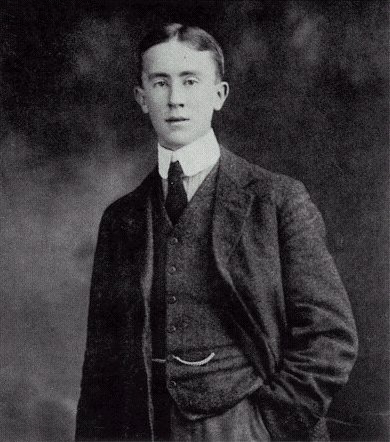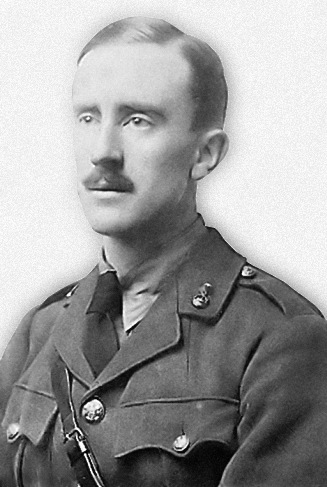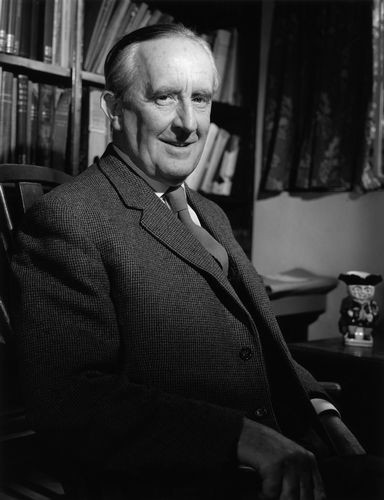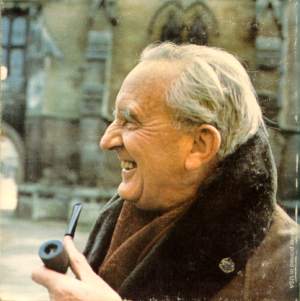<Back to Index>
- Philologist and Writer John Ronald Reuel Tolkien, 1892
- Painter and Physiologist Carl Gustav Carus, 1789
- Grand Duchess of Tuscany Maria Anna Elisa Bonaparte, 1777
PAGE SPONSOR



John Ronald Reuel Tolkien, CBE (3 January 1892 – 2 September 1973) was an English writer, poet, philologist, and university professor, best known as the author of the classic high fantasy works The Hobbit, The Lord of the Rings, and The Silmarillion.
Tolkien was Rawlinson and Bosworth Professor of Anglo - Saxon at Oxford University from 1925 to 1945 and Merton Professor of English Language and Literature there from 1945 to 1959. He was a close friend of C.S. Lewis — they were both members of the informal literary discussion group known as the Inklings. Tolkien was appointed a Commander of the Order of the British Empire by Queen Elizabeth II on 28 March 1972. After his death, Tolkien's son Christopher published a series of works based on his father's extensive notes and unpublished manuscripts, including The Silmarillion. These, together with The Hobbit and The Lord of the Rings form a connected body of tales, poems, fictional histories, invented languages, and literary essays about a fantasy world called Arda, and Middle - earth within it. Between 1951 and 1955, Tolkien applied the term legendarium to the larger part of these writings. While many other authors had published works of fantasy before Tolkien, the great success of The Hobbit and The Lord of the Rings led directly to a popular resurgence of the genre. This has caused Tolkien to be popularly identified as the "father" of modern fantasy literature — or, more precisely, of high fantasy. In 2008, The Times ranked him sixth on a list of "The 50 greatest British writers since 1945". Forbes ranked him the 5th top - earning dead celebrity in 2009.
Most of Tolkien's paternal ancestors were craftsmen. The Tolkien family had its roots in Lower Saxony, but had been living in England since the 18th century, becoming "quickly intensely English". The surname Tolkien is said to come from the German word tollkühn ("foolhardy"). German writers have suggested that in reality the name is more likely to derive from the village Tolkynen, near Rastenburg, East Prussia. The name of that place is derived from the now extinct Old Prussian language.
Tolkien's maternal grandparents, John and Edith Jane Suffield, were Baptists who lived in Birmingham and owned a shop in the city centre. The Suffield family had run various businesses out of the same building, called Lamb House, since the early 19th century. From 1810 Tolkien's great - great - grandfather William Suffield had a book and stationery shop there; from 1826 Tolkien's great - grandfather, also named John Suffield, had a drapery and hosiery business there.
John Ronald Reuel Tolkien was born on 3 January 1892 in Bloemfontein in the Orange Free State (now Free State Province, part of South Africa) to Arthur Reuel Tolkien (1857 – 1896), an English bank manager, and his wife Mabel, née Suffield (1870 – 1904). The couple had left England when Arthur was promoted to head the Bloemfontein office of the British bank for which he worked. Tolkien had one sibling, his younger brother, Hilary Arthur Reuel, who was born on 17 February 1894.
As a child, Tolkien was bitten by a large baboon spider in the garden, an event which some think would have later echoes in his stories, although Tolkien admitted no actual memory of the event and no special hatred of spiders as an adult. In another incident, a family house - boy, who thought Tolkien a beautiful child, took the baby to his kraal to show him off, returning him the next morning.
When he was three, Tolkien went to England with his mother and brother on what was intended to be a lengthy family visit. His father, however, died in South Africa of rheumatic fever before he could join them. This left the family without an income, and so Tolkien's mother took him to live with her parents in Kings Heath, Birmingham. Soon after, in 1896, they moved to Sarehole (now in Hall Green), then a Worcestershire village, later annexed to Birmingham. He enjoyed exploring Sarehole Mill and Moseley Bog and the Clent, Lickey and Malvern Hills, which would later inspire scenes in his books, along with Worcestershire towns and villages such as Bromsgrove, Alcester, and Alvechurch and places such as his aunt Jane's farm of Bag End, the name of which would be used in his fiction.
Mabel Tolkien herself taught her two sons, and Ronald, as he was known in the family, was a keen pupil. She taught him a great deal of botany and awakened in him the enjoyment of the look and feel of plants. Young Tolkien liked to draw landscapes and trees, but his favourite lessons were those concerning languages, and his mother taught him the rudiments of Latin very early. He could read by the age of four and could write fluently soon afterwards. His mother allowed him to read many books. He disliked Treasure Island and The Pied Piper and thought Alice's Adventures in Wonderland by Lewis Carroll was "amusing but disturbing". He liked stories about "Red Indians" and the fantasy works by George MacDonald. In addition, the "Fairy Books" of Andrew Lang were particularly important to him and their influence is apparent in some of his later writings.
Tolkien attended King Edward's School, Birmingham, and later St. Philip's School, before winning a Foundation Scholarship and returning to King Edward's School. While a pupil at King Edward's School, he was one of a party of cadets from the school's Officers Training Corps who helped "line the route" for the coronation parade of King George V, being posted just outside the gates of Buckingham Palace.
Mabel Tolkien was received into the Roman Catholic Church in 1900 despite vehement protests by her Baptist family, who then stopped all financial assistance to her. In 1904, when Tolkien was 12, she died of acute diabetes at Fern Cottage in Rednal, which she was then renting. Mabel Tolkien was then about 34 years of age, about as old as a person with diabetes mellitus type 1 could live with no treatment — insulin would not be discovered until two decades later. Nine years after his mother's death, Tolkien wrote, "My own dear mother was a martyr indeed, and it is not to everybody that God grants so easy a way to his great gifts as he did to Hilary and myself, giving us a mother who killed herself with labour and trouble to ensure us keeping the faith."
Prior to her death, Mabel Tolkien had assigned the guardianship of her sons to Fr. Francis Xavier Morgan of the Birmingham Oratory, who was assigned to bring them up as good Catholics. Tolkien grew up in the Edgbaston area of Birmingham. He lived there in the shadow of Perrott's Folly and the Victorian tower of Edgbaston Waterworks, which may have influenced the images of the dark towers within his works. Another strong influence was the romantic medievalist paintings of Edward Burne - Jones and the Pre-Raphaelite Brotherhood; the Birmingham Museum and Art Gallery has a large and world renowned collection of works and had put it on free public display from around 1908.
In 1911, while they were at King Edward's School, Birmingham, Tolkien and three friends, Rob Gilson, Geoffrey Smith, and Christopher Wiseman, formed a semi - secret society which they called "the T.C.B.S.", the initials standing for "Tea Club and Barrovian Society", alluding to their fondness for drinking tea in Barrow's Stores near the school and, secretly, in the school library. After leaving school, the members stayed in touch, and in December 1914 they held a "Council" in London, at Wiseman's home. For Tolkien, the result of this meeting was a strong dedication to writing poetry.
The
1911 census of England & Wales shows Tolkien (occupation "school")
lodging at 4 Highfield Road, Edgbaston, along with his brother Hilary
(occupation "hardware merchant's clerk").
In the summer of 1911, Tolkien went on holiday in Switzerland, a trip that he recollects vividly in a 1968 letter, noting that Bilbo's journey across the Misty Mountains ("including the glissade down the slithering stones into the pine woods") is directly based on his adventures as their party of 12 hiked from Interlaken to Lauterbrunnen and on to camp in the moraines beyond Mürren. Fifty - seven years later, Tolkien remembered his regret at leaving the view of the eternal snows of Jungfrau and Silberhorn ("the Silvertine (Celebdil) of my dreams"). They went across the Kleine Scheidegg to Grindelwald and on across the Grosse Scheidegg to Meiringen. They continued across the Grimsel Pass, through the upper Valais to Brig and on to the Aletsch glacier and Zermatt.
In October of the same year, Tolkien began studying at Exeter College, Oxford. He initially studied Classics but changed his course in 1913 to English Language and Literature, graduating in 1915 with first - class honours in his final examinations.
At the age of 16, Tolkien met
Edith Mary Bratt,
who was three years older, when he and his brother Hilary moved into
the boarding house in which she lived. According to Humphrey Carpenter:
Edith and Ronald took to frequenting Birmingham teashops, especially one which had a balcony overlooking the pavement. There they would sit and throw sugarlumps into the hats of passers - by, moving to the next table when the sugar bowl was empty. ... With two people of their personalities and in their position, romance was bound to flourish. Both were orphans in need of affection, and they found that they could give it to each other. During the summer of 1909, they decided that they were in love.
His guardian, Father Francis Morgan, viewing Edith as a distraction from Tolkien's school work and horrified that his young charge was seriously involved with a Protestant girl, prohibited him from meeting, talking to, or even corresponding with her until he was 21. He obeyed this prohibition to the letter, with one notable early exception which made Father Morgan threaten to cut short his University career if he did not stop.
On the evening of his twenty - first birthday, Tolkien wrote to Edith a declaration of his love and asked her to marry him. Edith replied saying that she had already agreed to marry another man, but that she had done so because she had believed Tolkien had forgotten her. The two met up and beneath a railway viaduct renewed their love; Edith returned her engagement ring and announced that she was marrying Tolkien instead. Following their engagement Edith reluctantly announced that she was converting to Catholicism at Tolkien's insistence. Her landlord, a staunch Protestant, was infuriated and evicted her as soon as she was able to find other lodgings. Edith and Ronald were formally engaged in Birmingham, in January 1913, and married at Warwick, England, at Saint Mary Immaculate Catholic Church on 22 March 1916.
In 1914, the United Kingdom entered World War I. Tolkien's relatives were shocked when he elected not to immediately volunteer for the British Army. Instead, Tolkien entered a programme wherein he delayed enlisting until completing his degree in July 1915. He was then commissioned as a Second Lieutenant in the Lancashire Fusiliers. He trained with the 13th (Reserve) Battalion on Cannock Chase, Staffordshire, for eleven months. In a letter to Edith, Tolkien complained, "Gentlemen are rare among the superiors, and even human beings rare indeed." Tolkien was then transferred to the 11th (Service) Battalion with the British Expeditionary Force, arriving in France on 4 June 1916. His departure from England on a troop transport inspired him to write his poem, The Lonely Isle. He later wrote, "Junior officers were being killed off, a dozen a minute. Parting from my wife then ... it was like a death."
Tolkien served as a signals officer at the Somme, participating in the Battle of Thiepval Ridge and the subsequent assault on the Schwaben Redoubt. According to John Garth, however:
Although Kitchener's army enshrined old social boundaries, it also chipped away at the class divide by throwing men from all walks of life into a desperate situation together. Tolkien wrote that the experience taught him, 'a deep sympathy and feeling for the Tommy; especially the plain soldier from the agricultural counties.' He remained profoundly grateful for the lesson. For a long time, he had been imprisoned in a tower, not of pearl, but of ivory.
Tolkien's time in combat was a terrible stress for Edith, who feared that every knock on the door might carry news of her husband's death. In order to get around the British Army's postal censorship, the Tolkiens had developed a secret code which accompanied his letters home. By using the code, Edith was able to track her husband's movements on a map of the Western Front.
On 27 October 1916 Tolkien came down with trench fever, a disease carried by the lice which were common in the dugouts. According to the memoirs of the Reverend Mervyn S. Evers, Anglican chaplain to the Lancashire Fusiliers:
On one occasion I spent the night with the Brigade Machine Gun Officer and the Signals Officer in one of the captured German dugouts ... We dossed down for the night in the hopes of getting some sleep, but it was not to be. We no sooner lay down than hordes of lice got up. So we went round to the Medical Officer, who was also in the dugout with his equipment, and he gave us some ointment which he assured us would keep the little brutes away. We anointed ourselves all over with the stuff and again lay down in great hopes, but it was not to be, because instead of discouraging them it seemed to act like a kind of hors d'oeuvre and the little beggars went at their feast with renewed vigour.
Tolkien was invalided to England on 8 November 1916. Many of his dearest school friends, including Gilson and Smith of the T.C.B.S., were killed in the war. In later years, Tolkien indignantly declared that those who searched his works for parallels to the Second World War were entirely mistaken:
One has indeed personally to come under the shadow of war to feel fully its oppression; but as the years go by it seems now often forgotten that to be caught in youth by 1914 was no less hideous an experience than to be involved in 1939 and the following years. By 1918 all but one of my close friends were dead.
During his recovery in a cottage in Little Haywood, Staffordshire, he began to work on what he called The Book of Lost Tales, beginning with The Fall of Gondolin. Throughout 1917 and 1918 his illness kept recurring, but he had recovered enough to do home service at various camps and was promoted to Lieutenant. It was at this time that Edith bore their first child, John Francis Reuel Tolkien.
When he was stationed at Kingston upon Hull, he and Edith went walking in the woods at nearby Roos, and Edith began to dance for him in a clearing among the flowering hemlock. After his wife's death in 1971, Tolkien remembered,
I never called Edith Luthien – but she was the source of the story that in time became the chief part of the Silmarillion. It was first conceived in a small woodland glade filled with hemlocks at Roos in Yorkshire (where I was for a brief time in command of an outpost of the Humber Garrison in 1917, and she was able to live with me for a while). In those days her hair was raven, her skin clear, her eyes brighter than you have seen them, and she could sing – and dance. But the story has gone crooked, & I am left, and I cannot plead before the inexorable Mandos.
This incident inspired the account of the meeting of Beren and Lúthien, and Tolkien often referred to Edith as "my Lúthien".
Tolkien's first civilian job after World War I was at the
Oxford English Dictionary, where he worked mainly on the history and etymology of words of Germanic origin beginning with the letter W. In 1920, he took up a post as Reader in English Language at the University of Leeds, and became the youngest professor there. While at Leeds, he produced A Middle English Vocabulary and a definitive edition of Sir Gawain and the Green Knight with E.V. Gordon, both becoming academic standard works for many decades. He also translated Sir Gawain, Pearl, and Sir Orfeo. In 1925, he returned to Oxford as Rawlinson and Bosworth Professor of Anglo - Saxon, with a fellowship at Pembroke College.
During his time at Pembroke, Tolkien wrote The Hobbit and the first two volumes of The Lord of the Rings, whilst living at 20 Northmoor Road in North Oxford (where a blue plaque was placed in 2002). He also published a philological essay in 1932 on the name "Nodens", following Sir Mortimer Wheeler's unearthing of a Roman Asclepieion at Lydney Park, Gloucestershire, in 1928.
Tolkien's 1936 lecture, "Beowulf: The Monsters and the Critics," had a lasting influence on Beowulf research. Lewis E. Nicholson said that the article Tolkien wrote about Beowulf is "widely recognized as a turning point in Beowulfian criticism", noting that Tolkien established the primacy of the poetic nature of the work as opposed to its purely linguistic elements. At the time, the consensus of scholarship deprecated Beowulf for dealing with childish battles with monsters rather than realistic tribal warfare; Tolkien argued that the author of Beowulf was addressing human destiny in general, not as limited by particular tribal politics, and therefore the monsters were essential to the poem. Where Beowulf does deal with specific tribal struggles, as at Finnsburg, Tolkien argued firmly against reading in fantastic elements. In the essay, Tolkien also revealed how highly he regarded Beowulf: "Beowulf is among my most valued sources," and this influence may be seen throughout his Middle - earth legendarium.
According to Humphrey Carpenter, Tolkien had an ingenious means of beginning his series of lectures on Beowulf:
He would come silently into the room, fix the audience with his gaze, and suddenly begin to declaim in a resounding voice the opening lines of the poem in the original Anglo - Saxon, commencing with a great cry of Hwæt! (The first word of this and several other Old English poems), which some undergraduates took to be 'Quiet!' It was not so much a recitation as a dramatic performance, an impersonation of an Anglo - Saxon bard in a mead hall, and it impressed generations of students because it brought home to them that Beowulf was not just a set text to be read for the purposes of examination, but a powerful piece of dramatic poetry.
Decades later, W.H. Auden wrote to his former professor,
"I don't think that I have ever told you what an unforgettable experience it was for me as an undergraduate, hearing you recite Beowulf. The voice was the voice of Gandalf."
In 2003, Tolkien's handwritten translation of and commentary on Beowulf, running to roughly 2000 pages, was discovered in the archives of the Bodleian Library.
In the run-up to World War II, Tolkien was earmarked as a codebreaker. In January 1939, he was asked whether he would be prepared to serve in the cryptographical department of the Foreign Office in the event of national emergency. He replied in the affirmative and, beginning on 27 March, took an instructional course at the London HQ of the Government Code and Cypher School. However, although he was "keen" to become a codebreaker, he was informed in October that his services would not be required at that time. Ultimately he never served as one. In 2009, The Daily Telegraph claimed Tolkien turned down a £500 a year offer to become a full time recruit for unknown reasons.
Although Tolkien detested Adolf Hitler and Nazism, he was also appalled by Allied bombing raids on Germany. In a 1945 letter to his son Christopher, Tolkien wrote:
We were supposed to have reached a stage of civilization in which it might still be necessary to execute a criminal, but not to gloat, or to hang his wife and child by him while the orc-crowd hooted. The destruction of Germany, be it 100 times merited, is one of the most appalling world - catastrophes. Well, well, — you and I can do nothing about it. And that should be a measure of the amount of guilt that can justly be assumed to attach to any member of a country who is not a member of its actual Government. Well the first War of the Machines seems to be drawing to its final inconclusive chapter — leaving, alas, everyone the poorer, many bereaved or maimed and millions dead, and only one thing triumphant: the Machines.
In 1945, Tolkien moved to Merton College, Oxford, becoming the Merton Professor of English Language and Literature, in which post he remained until his retirement in 1959. He served as an external examiner for University College, Dublin, for many years. In 1954 Tolkien received an honorary degree from the National University of Ireland (of which U.C.D. was a constituent college). Tolkien completed The Lord of the Rings in 1948, close to a decade after the first sketches.
Tolkien also translated the Book of Jonah for the Jerusalem Bible, which was published in 1966.
The
Tolkiens had four children: John Francis Reuel Tolkien (17 November
1917 – 22 January 2003), Michael Hilary Reuel Tolkien (22 October
1920 – 27 February 1984),
Christopher John Reuel Tolkien (born
21 November 1924) and Priscilla Mary Anne Reuel Tolkien (born 18 June
1929). Tolkien was very devoted to his children and sent them
illustrated letters from Father Christmas when they were young. Each year more characters were added, such as the
Polar Bear (Father Christmas's helper), the Snow Man (his gardener),
Ilbereth the elf (his secretary), and various other, minor characters.
The major characters would relate tales of Father Christmas's battles
against goblins who rode on bats and the various pranks committed by the Polar Bear.
Fan attention became so intense that Tolkien had to take his phone number out of the public directory, and eventually he and Edith moved to Bournemouth, which was then a seaside resort patronized by the British upper class. Tolkien's status as a bestselling author gave them easy entry into polite society, but Tolkien deeply missed the company of his fellow intellectuals. Edith, however, was overjoyed to step into the role of a society hostess, which was the reason that Tolkien selected Bournemouth in the first place.
According to Humphrey Carpenter,
Those friends who knew Ronald and Edith Tolkien over the years never doubted that there was deep affection between them. It was visible in the small things, the almost absurd degree in which each worried about the other's health, and the care in which they chose and wrapped each other's birthday presents'; and in the large matters, the way in which Ronald willingly abandoned such a large part of his life in retirement to give Edith the last years in Bournemouth that he felt she deserved, and the degree in which she showed pride in his fame as an author. A principal source of happiness to them was their shared love of their family. This bound them together until the end of their lives, and it was perhaps the strongest force in the marriage. They delighted to discuss and mull over every detail of the lives of their children, and later their grandchildren.
Tolkien was appointed by Queen Elizabeth II a Commander of the Order of the British Empire in the New Year's Honours List of 1 January 1972 and received the insignia of the Order at Buckingham Palace on 28 March 1972. In the same year Oxford University conferred upon him an honorary Doctorate of Letters.
Tolkien's wife, Edith, died on 29 November 1971, at the age of 82. Tolkien had the name Lúthien engraved on the stone at Wolvercote Cemetery, Oxford. When Tolkien died 21 months later on 2 September 1973, at the age of 81, he was buried in the same grave, with Beren added to his name.



